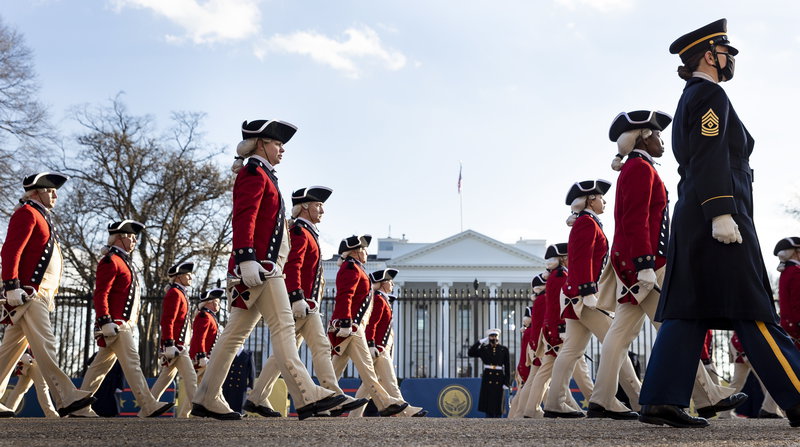AnAlYsiS
The FRACTURE of the United States
In an unusual handover, held in the absence of the outgoing president and under threat of armed assault on the main government buildings of different states in the country, Joe Biden took office as the 46th president of the United States of America in January. Two weeks earlier, a mob of rioters violently stormed Congress, urged on by the outgoing president and seemingly with the connivance or sympathy of the Capitol police. The images from that day are more pertinent to a banana republic than the world’s greatest democracy. In fact, ‘Who is the banana republic now?’ was the headline in the Kenya Daily Nation on January 8.
The rioters, who seized and destroyed offices in Congress over several hours, did so in the name of freedom, democracy and the Constitution, convinced that there is an international conspiracy led by Democrat leaders, financial and big tech tycoons, members of the Washington establishment, Pope Francis, Barack Obama and Hillary Clinton of course, and an international paedophile network seeking to implant communism in the US and do away with the precious freedoms the “pilgrim fathers” brought with them when the Mayflower arrived off the coast of Massachusetts on November 11, 1620. A considerable number of Donald Trump’s 74 million voters, including some senior Republican leaders, are convinced of such a conspiracy.
The underlying problem Biden and Kamala Harris face now that Trump’s tenure has come to an end is that supremacist and far-right groups like the Proud Boys, the National Socialist Club (neo-Nazi), and ultra-conservative independent evangelical churches (on January 5, the Christian nationalist group Jericho March organised marches around the Capitol - like the biblical Joshua and the Israelites surrounding the city of Jericho - to pray for the defeat of “dark and corrupt” forces - the globalists, socialists, communists, and liberals – who stole the election from the president anointed by God) today have the support of 25% of Republican voters, something which was unthinkable four years ago. Even worse, according to polls carried out by CBS News/YouGov and PBS Newshour/Marist College - published by The Washington Post on January 13- although the majority of all citizens (87%) and Republicans (79%) disapprove of the assault on the Capitol, 21% of Republicans approve of those who entered Congress violently, 43% describe their actions as “patriotism”, 50% as “defense of freedoms” and 47% believe it was “a legitimate protest” (www.washingtonpost.com/politics/2021/01/13/lurking-beneath-surface-gop-plenty-sympathy-those-who-stormed-capitol/).
The problem facing the Republican Party is therefore also a very serious one, because white supremacism, which has the Confederate flag as its symbol of identity, is radically opposed to the legacy of Abraham Lincoln, the Republican president who abolished slavery in the course of the civil war (1861-65). Ultimately, Trump is politically finished, but the seeds of Trumpism have taken root and caused a socio-political rift that will be hard to close. What was on the point of happening in the US is similar to what is happening in Hungary (and partly in Poland) - defined as illiberal democracies by Fareed Zakaria in 1997, that is, “democratically elected regimes, often re-elected or reaffirmed through referendums, who daily ignore the constitutional limits of their power and deprive their citizens of basic rights and freedoms.”
Biden will also have to deal with an economy that has deteriorated in recent months, with the loss of jobs made worse by the pandemic, which has already caused over 400,000 deaths (largely thanks to Trump’s disastrous management of the health crisis; the US is the country with the most deaths, followed by Brazil, with over 220,000 victims, where president Jair Bolsonaro is a leading Trump disciple). As an immediate shock measure, Biden has pledged 1.9 trillion dollars to combat the health emergency and prevent a recession: 1 trillion in direct cheques of 1,400 dollars to all households and 440 billion to aid small and medium-sized businesses. The situation is so delicate that in its main headline this month’s Foreign Affairs asks whether America can even recover.
The answer is that Biden can gain legitimacy and respect by controlling the pandemic, fighting corruption, reopening the US to the world (returning to the Paris Agreement on climate change, reversing the most controversial migration policies, reopening transatlantic dialogue, rethinking global health security to prevent future disasters, redefining relations with China and Middle East policies...), and pushing for a two-stage economic plan, with immediate measures such as the announced shock plan to help the unemployed and foster recovery and broader structural reforms to regain the ground lost by the US economy in the past few years.
Yet, undoubtedly the most difficult and uncertain task in terms of results is to reknit a country deeply fractured by racial and religious differences. In this scenario, the Democrats garnered the support and votes of African Americans, Hispanics (except for anti-communist minorities - mostly Cubans - and second- or third-generation Chicanos, who are often very conservative) and, in general, women and much of the liberal and business professionals in the big coastal cities. But at the same time they have ignored poor white workers and small and medium-sized businesses hardest hit by globalisation, who were captivated four years ago by Trump’s populism. It should not be forgotten that, despite losing the election, the former president got 11 million more votes than in 2016. If Biden and Harris fail to heal this rift, in four years someone can again pick up the populist discourse of illiberal democracies.
international





